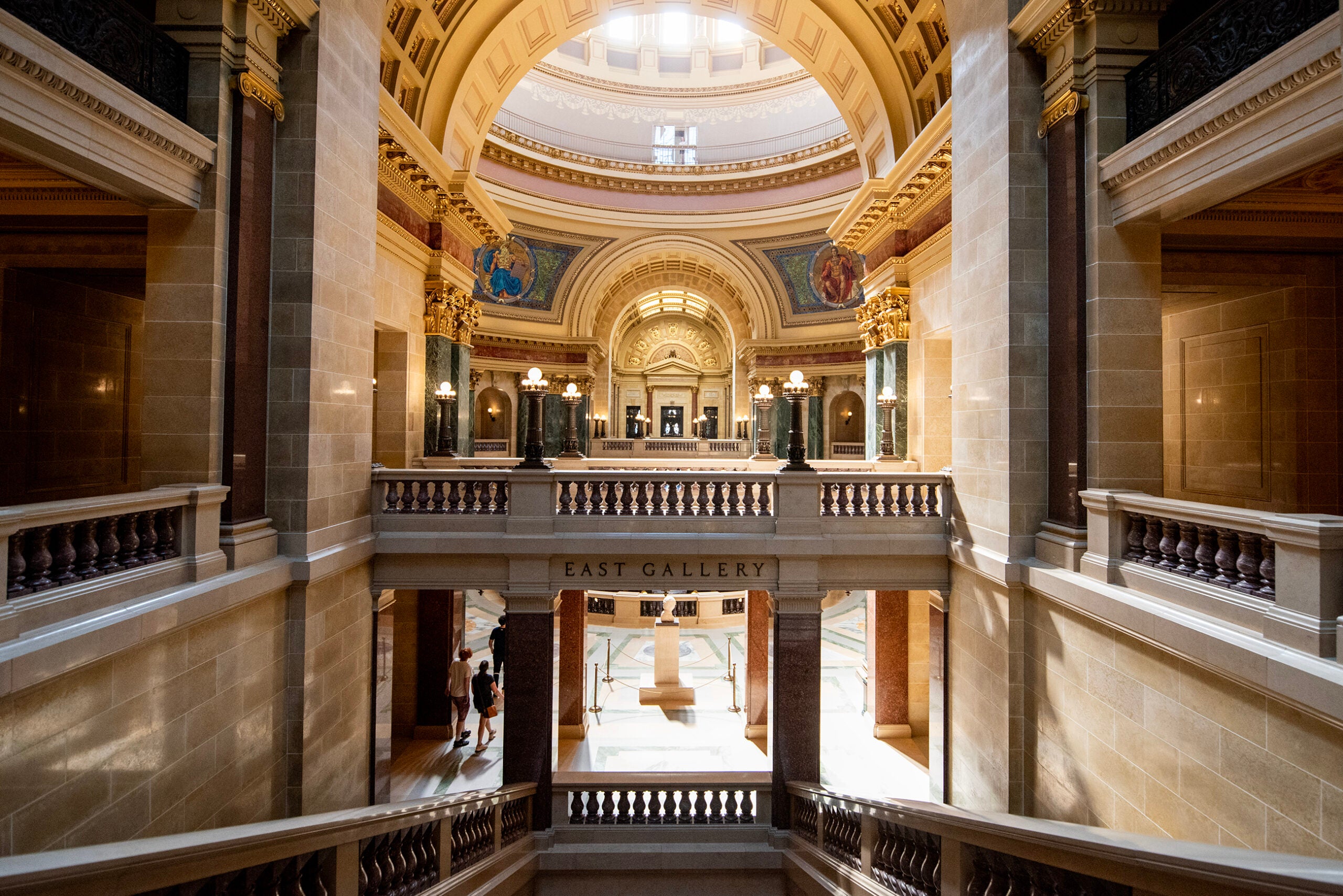Republicans in the Wisconsin Assembly have passed a package of tax cuts that would reduce income tax collections by roughly $1.4 billion per year, with targeted cuts for retirees, married couples and parents.
Taken as a whole, the bills would largely spend down the remainder of the state’s historic budget surplus, though it remains unclear whether Democratic Gov. Tony Evers will sign them.
The largest of the tax cuts would expand the state’s second lowest income tax bracket, so that people who earn more money would pay lower rates.
News with a little more humanity
WPR’s “Wisconsin Today” newsletter keeps you connected to the state you love without feeling overwhelmed. No paywall. No agenda. No corporate filter.
Right now, the bracket covers earnings between $14,320 to $28,640 for individuals and $19,090 to $38,190 for married couples. Under the GOP bill, it would expand to cover earnings up to $112,500 for individuals and $150,000 for married couples. The tax rate for people who get the cut would go from 5.3 percent down to 4.4 percent.
Republicans acknowledged that their plan would largely use up the state’s surplus, which is projected to be more than $3 billion at the start of the next budget cycle.
“Let’s stop holding this multibillion dollar surplus as a slush fund here in Madison, which can only be used to grow government,” said Rep. Nik Rettinger, R-Mukwonago, “and instead return it back to the taxpayers it belongs to.”
Democrats said the plan would wipe out Wisconsin’s surplus and leave a deficit, making it harder to fund expenses like education in future deficits.
Rep. Tip McGuire, D-Kenosha, said Republicans were forcing Evers to be the “adult in the room.”
“He’s going to have to be the one who’s responsible. He’s going to be the one that saves you from yourself,” McGuire said.
In addition to the income tax cut, the bills Republicans passed Tuesday would cut taxes in a few different ways.
- The second-largest plan would cut taxes on retirees 65 and older by excluding the first $75,000 of retirement income subject to state taxes. For married couples, the bill would exempt the first $150,000. The average tax cut would be $1,582.
- Another plan would increase an existing nonrefundable tax credit for married couples from $480 to $870. GOP backers say the change reflects what the original tax credit would have grown to had it been indexed to inflation.
- The fourth GOP tax cut would expand the state credit for child and dependent care expenses to 100 percent of what someone claims on their federal income tax return. Right now, the state credit only covers up to 50 percent of the federal credit.
When broken down, the Legislature’s nonpartisan budget office said the income tax cut would cost the state about $750 million annually, the retiree tax cut would cost about $470 million, the married couple tax credit would cost more than $160 million and the child care tax credit would cost about $70 million.
Republicans passed all four as separate bills, rather than as a single proposal.
“So the governor can pick and choose which one he wants,” said Rep. Tony Kurtz, R-Wonewoc. “It’s like a buffet.”
Evers has not said whether he will sign or veto the GOP tax cuts. During an interview that aired Sunday on WISN-TV, Evers said he had reviewed all the plans.
“I’m sure there’s some that we would agree on,” Evers said. “For example, the child care tax credit seems like something that would work.”
While the income tax, retiree and married couple tax cuts passed the Assembly along party lines, the child care tax credit passed on a bipartisan 92-4 vote.
Evers has vetoed other recent GOP tax cuts, including one in the budget that would have reduced taxes for all income brackets. But he signed a Republican-authored tax cut as part of the state budget two years ago.
Bill to end work permit requirement for 14- and 15-year-olds heads to Evers’ desk
In addition Tuesday, the state Assembly gave final approval to a bill that would end the work permit requirement for 14- and 15-year-olds.
The bill comes during a national push to loosen regulations governing what jobs minors can perform in the workplace.
The measure would not change state laws that govern how many hours minors can work and prohibit them from working dangerous jobs. But it would eliminate the state Department of Workforce Development’s only means of gathering child labor data, according to the agency.
During debate, some GOP backers of the plans talked about jobs they worked when they were teenagers, saying kids today were spending too much time on their cell phones.
“We have to somehow set a work ethic in some of our young people to make some money,” said Rep. Pat Snyder, R-Schofield.
Democrats argued against the plan, saying it was removing a protection for kids.
“This is a grown-up problem,” said Rep. Deb Andraca, D-Whitefish Bay. “Let’s not send our kids in to solve it.”
Wisconsin Republicans eliminated work permit requirements for 16- and 17-year-olds under former Republican Gov. Scott Walker.
Wisconsin Public Radio, © Copyright 2026, Board of Regents of the University of Wisconsin System and Wisconsin Educational Communications Board.







